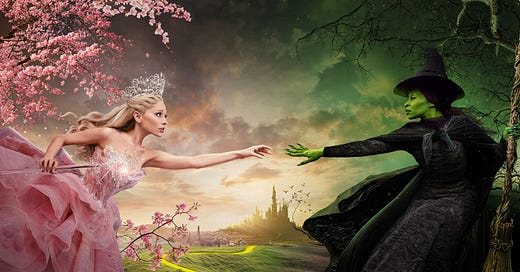Photo credit: Universal Pictures Canada.
A friend of mine recently faced a near-death experience after an allergic reaction to medication sent them into anaphylactic shock. In the aftermath, they found themselves revisiting the chapters of their life with new urgency. This experience compelled them to confront buried stories—moments of pain they had never dared to share. To tell these stories now requires immense bravery, knowing they could be met with judgment, misunderstanding, or rejection—or even fears of rejection that might not be real. What if their story, in fact, holds the power to heal or inspire others? We recently reconnected, and I was honoured and deeply inspired to listen to their story in video chapters they sent me over the weekend.
This unfolding process reminded me of the musical Wicked, which I had the chance to see this weekend. The story of Elphaba—the green-skinned, misunderstood protagonist—feels like a mirror to those who’ve been othered in society. The casting of Cynthia Erivo, a Black woman, adds profound depth to the narrative, highlighting the lived experiences of marginalized communities. Elphaba’s green skin becomes a powerful metaphor for difference, one that can’t be hidden or ignored. Every step she takes outside is an act of courage, exposing her to ridicule and judgment.
“She dances to music only she can feel, moving in a way that makes sense to her alone. It’s such an emotional moment, I held my breath to keep myself from sobbing in a quiet theatre.”
Elphaba’s journey, like my friend, is a masterclass in self-acceptance. She learns to love herself in a world that refuses to embrace her. Yet, her path is far from smooth. As her convictions are tested, the stakes grow higher. In one pivotal scene, she dances publicly as act of rebellion, despite being openly mocked. It’s a quiet but powerful moment. She dances to music only she can feel, moving in a way that makes sense to her alone. It’s such an emotional moment, I held my breath to keep myself from sobbing in a quiet theatre. We see her resolve deepen, her commitment to being herself solidify—even in the face of rejection, as her peers tease and laugh at her. This, to me, is one of the most extraordinary acts of bravery in the story: the willingness to risk being cast out by your own peers to stay true to who you are.
Isn’t this where being ourselves becomes most difficult? When the price of authenticity is isolation? When standing by our values might mean losing the approval of our community? It’s easy to be ourselves when there’s applause, but far harder when the room falls silent—or worse, erupts in laughter.
This tension is underscored by the character of Glinda, played by Ariana Grande. Glinda represents a form of white feminism—a well-meaning figure whose actions often hinge on preserving her own comfort and privilege.
, author and activist, explores the symbolism in Wicked in his profound Substack newsletter “Defying Gravity: Wicked and the Weight of Social Justice” which I highly recommend reading. Joseph illuminates that Glinda wants to do good, but only when it doesn’t challenge her privilege and place in the hierarchy. The contrast between Glinda and Elphaba is striking. One clings to a carefully curated image, while the other risks everything to live authentically.Elphaba’s story resonates because we all long to become our fullest selves. But the path to authenticity often feels fraught with risk. Will we be accepted? Will we be rejected? And yet, perhaps the bravest thing we can do is push through these fears, choosing to be ourselves even when it’s inconvenient, uncomfortable, or dangerous.
To truly become who we are meant to be often requires a kind of death—a shedding of the masks we wear to fit in. It’s not just the death of an image but the birth of something truer. And that kind of rebirth, as my friend has discovered, can feel like the ultimate act of rebellion in a world that thrives on conformity.
What mask are you ready to let go of to step into your truest self? Leave a comment below, I’d love to hear from you.
Sincerely,
Ashley aka Fake Guru






I think my greatest act of rebellion was divorcing my first husband. To the outside world, we had a solid relationship, didn't argue, everything seemed just dandy. But underneath it all, I was pretending to be someone I wasn't, and when I dared to let my true self emerge, she was met with immediate rejection. I knew I couldn't stay in that relationship as it was, and I couldn't ask him to change his values or who he was. Some might want to call it a mid-life crisis. It wasn't a crisis. It was an wakening.